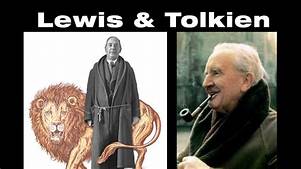I discovered JRR Tolkien in 1967, first was THE HOBBIT followed by the trilogy the Lord of the Rings (LOTR). I have continued to reread (LOTR) every year since. It is hard to continually read an author’s work without learning something about the author. JRR Tolkien was a professor who specialized in Norse mythology. An explanation I have heard is that he was disappointed that the English did not have a body of myths, as a prehistory, like the Norse and Germanic tribes. So he invented a myth LOTF complete with languages, calendar, alphabet (several), writing systems that actually work. This didn’t happen overnight.
Tolkien was not alone one of his best friends was a fellow professor CS Lewis. Tolkien was a devote Catholic, Lewis professed to be an atheist. He wasn’t willing to accept a religious philosophy as a hand me down and at the same time would not reject one out of shear obstinacy. The challenge was to convince CS Lewis that religion was entirely supported by logic and Christ was central and consistent.
I am not saying that JRR Tolkien alone deserves the credit, both men belonged to clubs given over to this type of debate. Eventually, CS Lewis converted to Catholicism and became one of the more visible lay defenders of the faith in the early twentieth century. The-power-of-conversation-a-lesson-from-CS-Lewis-and-JRR-Tolkien/
We may have the means to communicate ideas almost instantly. We can drag in disparate sources at the flick of a mouse, involve multimedia, power point, and statistics at such a volume that it would gag a maggot but I suspect that discourse, the back and forth has suffered for all the technology.
I rarely see any of Tolkien’s ruminations on theology, but C.S. Lewis seems to be enjoying a revival of sorts. There may be grist for the mill contained in his writings. The article I have cited is rather long. If you have no immediate need for the information, skip on by, but don’t discard. It may come in handy.
